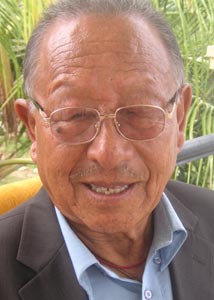Name: Khenrab Dakpa
(Alias: No)
Gender: Male
Interview Age: 80
Date of Birth: 1927
Birthplace: Boompa, Kham, Tibet
Year Left Tibet: 1958
Profession: Transportation
Monk/Nun: No
Political Prisoner: Yes

Interview No.: 46
Date: 2007-06-25
Language: Tibetan
Location: Lugsung Samdupling Settlement, Bylakuppe, Karnataka, India
Categories: Resistance and Revolution
Keywords: childhood memories, Chinese army -- invasion by , Chinese Nationalists/Kuomintang, Chushi Gangdrug guerrillas, escape experiences, forced labor, imprisonment, Kham, resistance fighters, trade
Summary:
Khenrab Dakpa belonged to a farming family from the village of Boompa where nearly 300 families lived. He earned a living as a mule driver, traveling to China, India and Lhasa transporting goods. He and other traders witnessed the Communist Chinese mistreating the Kuomintang Chinese during travel to China and they anticipated the same fate for the Tibetans.
Villagers began preparing by trading sheep for guns, while others were doubtful that the Chinese would harm them. Khenrab Dakpa was captured by the Chinese when he was 31 because the Chinese considered travelers like him to be troublemakers. He was sent to labor camp and interrogated frequently.
After escaping from prison after six months, Khenrab Dakpa joined the Chushi Gangdrug Resistance Force. He estimates there were 3,000 people at the guerrilla camp in Lhoka. Khenrab Dakpa discusses the courage and sacrifice of the Force's members. He makes special mention of Andrug Gonpo Tashi, founder of the Chushi Gangdrug, who is also known as Jindha 'Sponsor' for his offerings to the great monasteries of Tibet. Khenrab Dakpa also praises Lukhangwa, who was the representative of His Holiness the Dalai Lama, for his heroism and loyalty to the Tibetan people.
Interview Team:
- Rebecca Novick (Interviewer)
- Ronny Novick (Videographer)
- Tsering Dorjee (Interpreter)

